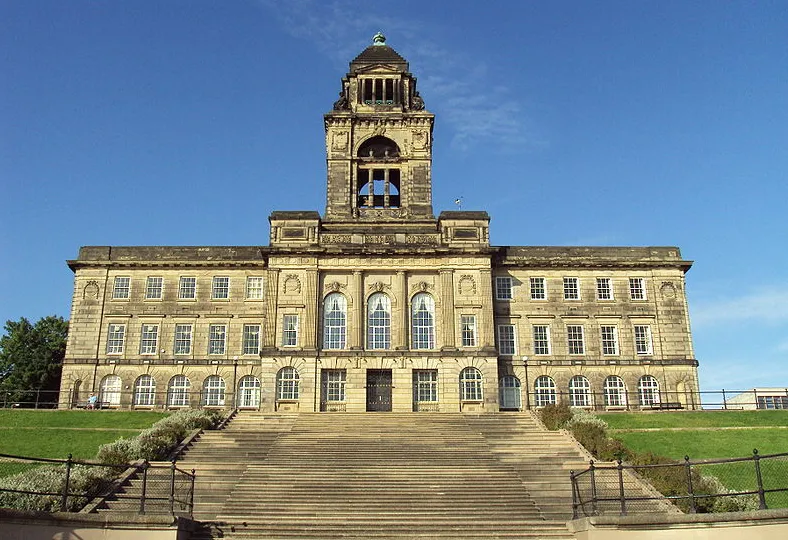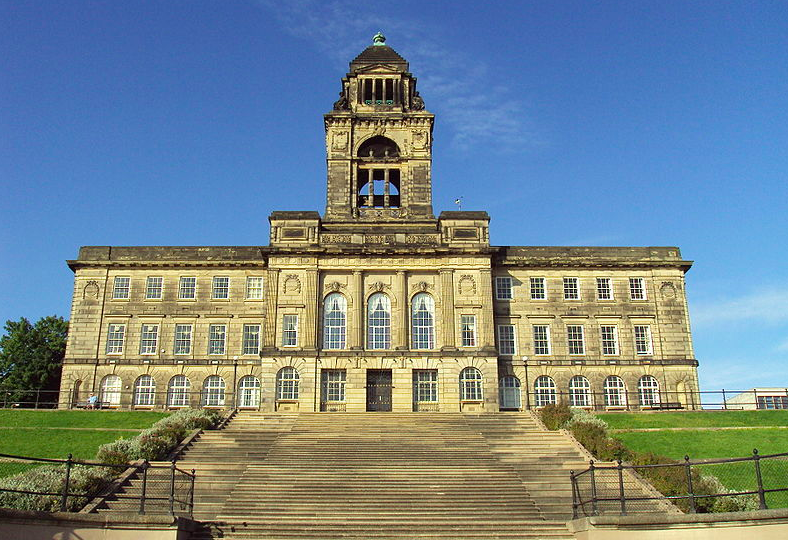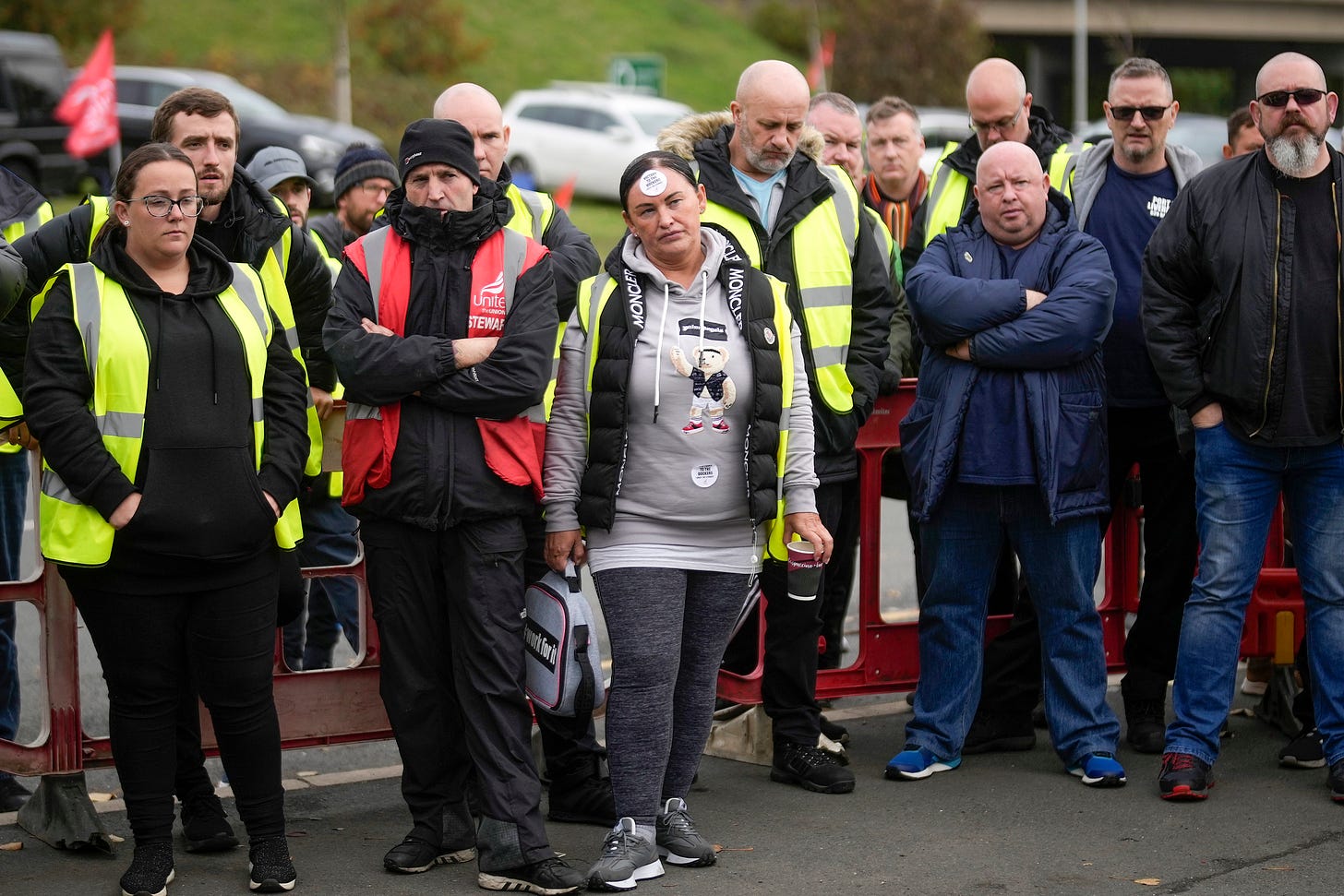‘We can’t trim the fat, there isn’t any fat, there isn’t even any bone’

In deep crisis, Wirral Council appeals to the government for help
Dear readers — political uncertainty is a frequent fixture of our briefings, but tends to focus on the swirling maelstrom of madness that constitutes Liverpool City Council. However, today we’re turning our attention across the Mersey to the Wirral, where rising costs and government cuts have left the council with an eye-watering £49 million deficit, up from £14 million last year. Council leader Janette Williamson has spoken to The Post about why she’s appealing for government help.
At the weekend we published an alarming piece by Harry Shukman who went undercover at a fringe church in Southport whose priest — Father Brendan King — believes Jews are plotting to “dissolve western nations, destroy their identity, their self-respect, their manliness” in order to enslave gentiles.
Disturbing and repugnant extremist antisemitic cult - great piece of journalism from the Liverpool Post
— Shaw-McIver Photography (@ShawMcIver) 6:44 AM ∙ Oct 15, 2022
Last week we sent out two great stories to our paying members. The first was a brilliant interview by Mollie with performance poet and historian Malik Al Nassir, who was traumatised by the care system as a child but turned his life around after meeting American poet and jazz musician Gil Scott-Heron. Then on Thursday we sent out a photo essay by Dani Cole on the effects of the cost of living crisis in Warrington. Read it here.
Post tips: If you want to tell us about a story or give us some information, please email editor@livpost.co.uk. We are always happy to speak to people off the record in the first instance, and we will treat your information with confidence and sensitivity. We’d particularly like to hear from staff working at the Royal Liverpool Hospital about their experiences moving into the new building.
I cannot express to you all how much I like the work of @liverpoolpost - they’re a really small team doing very good, long, well researched local journalism that helps buck the trend of constant egotistical pandering from both The Echo and Liverpool City Council.
— Matt Collins (@Mattophobia) 2:16 PM ∙ Aug 22, 2022
Editor’s appeal: Over the past year, The Post has reported on every aspect of the region — holding its authorities and politicians to account — and there are now almost 600 of you who pay to receive our reporting every week. However, our future is not yet secure. We’re aware that times are hard — any kind of support at all is greatly appreciated — but if you can afford a paid membership (it’s £1.34 a week if you pay for a year upfront) we can keep doing in-depth and investigative pieces like Harry’s weekend read. If you value The Post and want to help sustain high-quality journalism in Merseyside, please join today.
This week’s weather

This week’s weather forecast is sourced from the Met Office and it’s for Liverpool.
The big story: A deepening crisis at Wirral Council
Top line: Wirral Council is appealing for increased government funding after its budget deficit ballooned from £14 million to £49 million in a year, putting many of its services at risk.
Bailout? Jannette Williamson, the Labour leader of the council, tells The Post she objects to the use of the word “bailout” to describe the situation, believing it implies the fault lies at the door of the council.
“Bailout is almost judgemental. This isn’t a bailout. It’s fair funding, and it's long overdue. Ask any other council leader in the country and they’ll say the same,” Williamson says.
National picture: In August, the Local Government Association said there would be a "disastrous impact on local services" amid the rising cost of living if more funds were not provided. In a letter today they went further, saying there was a serious threat to the ability of councils to function “at even the most rudimentary level,” estimating that councils have already been operating with a £6 billion funding gap in adult social care over the last decade.
James Jamieson, the Conservative chairman of the LGA, has said that the prospect of government departments having to find further efficiency savings in public sector budgets has “sent a shiver down the spine” of local authorities, which were “already on a cliff-edge”. Inflation alone has caused a national £2.4 billion rise in costs on budgets set in March, and councils lost £15 billion from their core government funding in real terms between 2010 and 2020.
What could be cut? Among the most alarming reports to emerge in the past weeks is that Wirral Council might be forced to cut domestic abuse support, according to the Local Democracy Reporting Service. Whilst Williamson concedes that almost all non-statutory services will be looked at, she says that domestic abuse support will remain “as long as I’ve got breath in my body”.
“We’re dealing with a government operating the economics of a madhouse but as long as I’m here we are going to fight. You have to ask yourself what the point of local government is, we aren’t just here to empty people’s bins,” Williamson says.

For context about the importance of these services, read our investigation from earlier this year about domestic abuse support across Merseyside, which begins: “On the first day of February last year, a Monday morning that followed a bitterly cold weekend, emergency services on the Wirral received a call. At around 10:30am, Barry Ashton’s son had arrived at his door in Widnes without warning or invitation and tearfully announced that his long-term partner Helen was dead.”
More libraries could also be lost. The BBC reported that up to nine on the Wirral could be cut, though Williamson tells The Post that most of the at-risk libraries have now received “expressions of interest” from local community organisations about taking them on, though “one or two” have not and will likely close.
At a vote last week, Wirral Council formally voted to request extra funding. Labour, the Liberal Democrats and the Greens all backed the motion, while the Tories opposed it, arguing that it was too soon to be asking for more money.
- Conservative councillor Tom Anderson criticised the “doom and gloom-sayers,” and noted that the council received £11 million more than it expected last year.
- Others have criticised the council’s unanimous vote at the same meeting to reinstate the fracking ban (after the government lifted it) as a potential lost income stream, although local Conservatives have denied there was ever any intention to let it go ahead.
Bottom line: Councillors on the Wirral won’t be the only ones who listened carefully to chancellor Jeremy Hunt’s statement today. Given Hunt’s ideological proximity to the austerity years under David Cameron (he asserted in the statement that spending would “have to be cut”) it’s natural to fear that the council won’t get the money it is asking for.
Your Post briefing
Almost 600 dock workers at the Port of Liverpool will again go on strike in a row over wages and jobs later this month. The port has been one of several epicentres of strikes across Merseyside as unions argue that wages should keep pace with inflation amid the cost of living crisis. The offer of a 8.2% pay increase from Peel Ports is a real-terms pay cut according to union Unite. Peel Ports — which is considering redundancies — said its offer was more than 10% “greater than any UK port” and that the decision to strike is “self-defeating”. Unite general secretary Sharon Graham said that the dockers would be “standing firm”.
A £500 million, 52-strong fleet of trains are set to arrive for Merseyrail, with disruption expected in November as the final preparations are made. Strikes and the COVID pandemic have already caused disruptions to journey times, and Liverpool Central station will now be closed for four days to Northern line passengers in November. Services to Hunts Cross will be cancelled during the same period. Full details of the affected services can be found here.
Liverpool’s multi-million pound revamp of The Strand has been pushed back until after Eurovision. The Strand has remained pretty much untouched since the 50s, and after the spectacular failure of a Car Free day three weeks back, there will be increased pressure on the project, which is designed to try and better link the city centre and the waterfront for pedestrians and cyclists. Peter Randles, interim highways manager, told the council’s climate change and environment select committee that the work — which includes segregated cycle lanes, new traffic signal equipment, LED street lights, street trees and drainage improvements — will be delayed until May to avoid disrupting the city’s Eurovision hosting preparations.
Home of the week

It isn’t affordable and it looks like the sort of place you’d find a James Bond villain hanging out, but this £3.75 million house on the Wirral is extremely sexy. It has a swimming pool, views of the Dee Estuary and a staircase with gaps between the stairs: a certified marker of opulcance. We can dream.
Post Picks
⚽️ There’s a free screening of Comfort Angels, a documentary about the football team for women seeking asylum and refuge in Toxteth, in the Bloom Building on Thursday evening, followed by a panel discussion about the positive role football can play. Register here.
💡 River of Light is back on Friday evening. Illuminations and sound artworks are scattered around the Three Graces, Chapel Street and Castle Street, lighting up the city each evening for 17 nights. More here.
📄 Drop in to the Archives Centre at the Maritime Museum on Saturday afternoon to explore the personal archives of Dorothy Kuya, a young Communist activist and campaigner against racism, who is best known for founding the International Slavery Gallery (now the International Slavery Museum). Register here.
🇮🇪 The opening evening of Liverpool Irish Festival begins with speeches and ends with music and dancing from Tippin’ It Up and Gaelforce, who play Irish Traditional Music and Celtic Rock respectively. Register here.
🖼 Storeybookland is a pop-culture collage project on display at Output Gallery on for one weekend only, exploring iconic cultural figures, home furnishings and satanic sleaze. We like the collage of Joan Didion posing in a velvet chair, surrounded by raccoons, vinyl and cake. More here.
Our favourite reads
This feature in Tribune Magazine looks at the strength of support behind the Liverpool dock workers as they continue to strike for better pay and working conditions. “Perhaps most powerfully, the dockers have received international support from longshoremen from America, who donated $15,000 to the strike fund, as well as from dockers from the likes of Spain and Denmark, who sent delegations to the picket line in solidarity.”
It’s worth reading this review of The Doloriad in The New York Times, a dystopian debut written by Missouri Williams and published by Dead Ink books, an experimental literary publisher based in Liverpool who recently opened their own bookshop on Smithdown Road. Critic J. Robert Lennon writes that The Doloriad is “fantastically elaborate, presenting itself in long, bricklike blocks of text. At its best, it reads as Faulknerian, sinuous and formal. When well matched with what it describes, it is evocative, and takes on a historical, almost biblical weight.”
Speaking of Dead Ink Books, local writer Ronnie Hughes has written a lovely feature about his first visit for A Sense of Place, where he writes that it has the kind of relaxed atmosphere where you can sit and browse your maybe pile, but that there is also a great deal of thought and attention paid to the shop: “With small children’s books cleverly placed all along the bottom shelves I noticed, like someone’s thought about it. Like the place itself, thought about.”
A powerful profile of High Vis in The Guardian, a hardcore post-punk band who unpack their traumatic unbringings in their new album, Blending, which is named one of the writer’s albums of the year. Frontman Graham Sayle, who grew up in New Brighton, discusses overcoming anger in the wake of his father’s death, a former shipyard worker who died of asbestosis, and transcending the pain to create music.
Photo of the week

Liverpool dockers and Unite members at the picket lines on 12 October in a dispute over a below-inflation offer from Peel Ports Ltd. The employer has now issued redundancy notices to more than 15% of the workforce, 132 workers, citing weakening UK demand for manufactured and imported goods, alongside rising interest rates and higher energy costs.
Letters from readers
Christian cults like this do enormous damage to the public perception of all Christian faiths. I've spent this week supporting a young mother from our church whose partner stormed out of their house taking all their money and threatening to take their child. We sorted out rent, gas, elec, nappies, food and counselling for her. Unfortunately the good we do is not as newsworthy as the cults, ‘My Sunday morning inside Southport’s extremist Catholic sect’, Ruth Smart
Thanks for this courageous reporting. I guess you could say that you just don’t know who you’re living next door to. On the other hand, it’s important to remember that the vast, vast majority of people of faith are decent and caring and if anything, you’re more likely to be living next door to them. I was brought up catholic, and even though I’m now an atheist I have plenty of respect for anyone who chooses to follow a religion, ‘My Sunday morning inside Southport’s extremist Catholic sect’, Rob Schofield

Comments
Latest
Searching for enlightenment in Skelmersdale
I’m calling a truce. It’s time to stop the flouncing
The carnival queens of Toxteth
The watcher of Hilbre Island
‘We can’t trim the fat, there isn’t any fat, there isn’t even any bone’
In deep crisis, Wirral Council appeals to the government for help